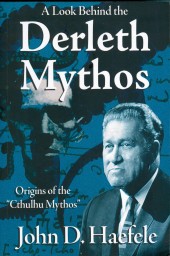 Many of you have probably read H. P. Lovecraft. Lovecraft has been called the most important horror writer of the Twentieth Century. He incorporated scientific discoveries of the time creating cosmic horror. One friend of mine considers Lovecraft to be no so much horror but “really down science fiction.”
Many of you have probably read H. P. Lovecraft. Lovecraft has been called the most important horror writer of the Twentieth Century. He incorporated scientific discoveries of the time creating cosmic horror. One friend of mine considers Lovecraft to be no so much horror but “really down science fiction.”
If you have read anything on Lovecraft’s life, the name August Derleth comes up. I think I first heard of August Derleth in L. Sprague de Camp’s biography of Lovecraft. De Camp from what I remember viewed Derleth as a less talented writer who stepped to take over the Cthulhu Mythos.
I was buying Robert M. Price’s small press zine, Crypt of Cthulhu in the 1980s. There was a whole lot of Derleth bashing going on. The guy couldn’t seem to catch an even break. This had an impact on me. I read the party line and generally avoided Derleth fiction for the most part.
In fact, the only Derleth fiction I can remember reading was “The Drifting Snow” and “The Lonesome Place” in some anthologies. I avoided his Cthulhu Mythos stories like the plague.
John D. Haefele has presented a book that examines some of ideology surrounding August Derleth in A Look Behind the Derleth Mythos. The book is divided into sections.
Thus Spake Lovecraft” is an examination of what Haefele called “The Lovecraft Mythos” and “The Cthulhu Mythos.” The Cthulhu Mythos is the amassed sum of all Mythos fiction, including pre-Lovecraft stories having element assimilated retroactively by Lovecraft or other writers, most Lovecraft Mythos tales, and all Mythos fiction by writers other than Lovecraft.
The Lovecraft Mythos is the fanciful background of nearly all Lovecraft stories, which holistically describes a larger, more encompassing Mythos than the Cthulhu Mythos.
The Derleth Mythos is nearly analogous with the Cthulhu Mythos stories, a pattern for the majority, against which Lovecraft’s more philosophically-oriented stories stand out in relief.
Frank Belknap Long’s “The Space-Eaters” is presented front and center of the beginning of contemporary non-Lovecraft Cthulhu Mythos. Lovecraft was happy for other writers to use his ideas. You had Robert E. Howard, Clark Ashton Smith, Robert Bloch all taking part. Derleth wrote some early Mythos stories in the early 1930s. Haefele considers these early Derleth Mythos stories to be “juvenilia.”
The middle section of the book (“Thus Said Derleth”) covers Derleth’s efforts with Arkham House. John Haefele and I were talking about the legend of Weird Tales in spite of all the bad fiction that Farnsworth Wright published. He pointed that the legend of Weird Tales is in large part due to Derleth’s efforts with Arkham House preserving the best fiction. One point made is Derleth was helping out Weird Tales magazine in the 1940s providing new Cthulhu Mythos stories, which were popular.
The author points out that without the income for The Trail of Cthulhu, you wouldn’t have Lovecraft’s Selected Letters.
The last section “Thus Wrote Alhazred” covers what Haefele calls the out and out Lovecraft pastiches by Derleth. Derleth was worried Lovecraft might fade away. His answer was to create stories out of ideas left behind by Lovecraft.
A case is never made that Derleth is the greatest writer of horror. It is pointed out that Derleth had the highest literary status of any Weird Tales in the 1930s due to his mainstream fiction. A Guggenheim Fellowship had been awarded to Derleth. Sinclair Lewis praised his work. Charles Scribner’s Sons published Derleth from 1935 to 1946.
What this does is go through the genesis of Lovecraft’s mythos, the spreading of his ideas to other writers including Derleth, the foundation of Arkham House, and the reasoning behind Derleth’s writing of Cthulhu Mythos fiction. Some ideas such as Derleth being a devout Catholic are examined and shown to be more myth than reality.
This book is probably 40% about Lovecraft and the genesis of the Cthulhu Mythos. The remainder is about Derleth’s handling of the Cthulhu Mythos. So if you are a Lovecraft fan or like tentacular fiction, this might be of interest.
If you read Sunand Tryambak Joshi’s The Rise and Fall of the Cthulhu Mythos, you should then read John Haefele’s A Lood Behind the Derleth Mythos.
The Cimmerian Press published this book as a revised trade paperback last year. You can get it at Amazon.com. A brand new kindle edition with some added items just became available about two weeks ago.
Hi, very interessting article, it gave me envy to read this book and also the others quotes at the end of the text. But I don’t think that they are translated in french :/
Does he do any analysis at all as to why Derleth is differnt?
-
There is some but more is put into Derleth’s impetus. I have been reading Derleth writing as Lovecraft this week. I am making notes on Derleth writing style.